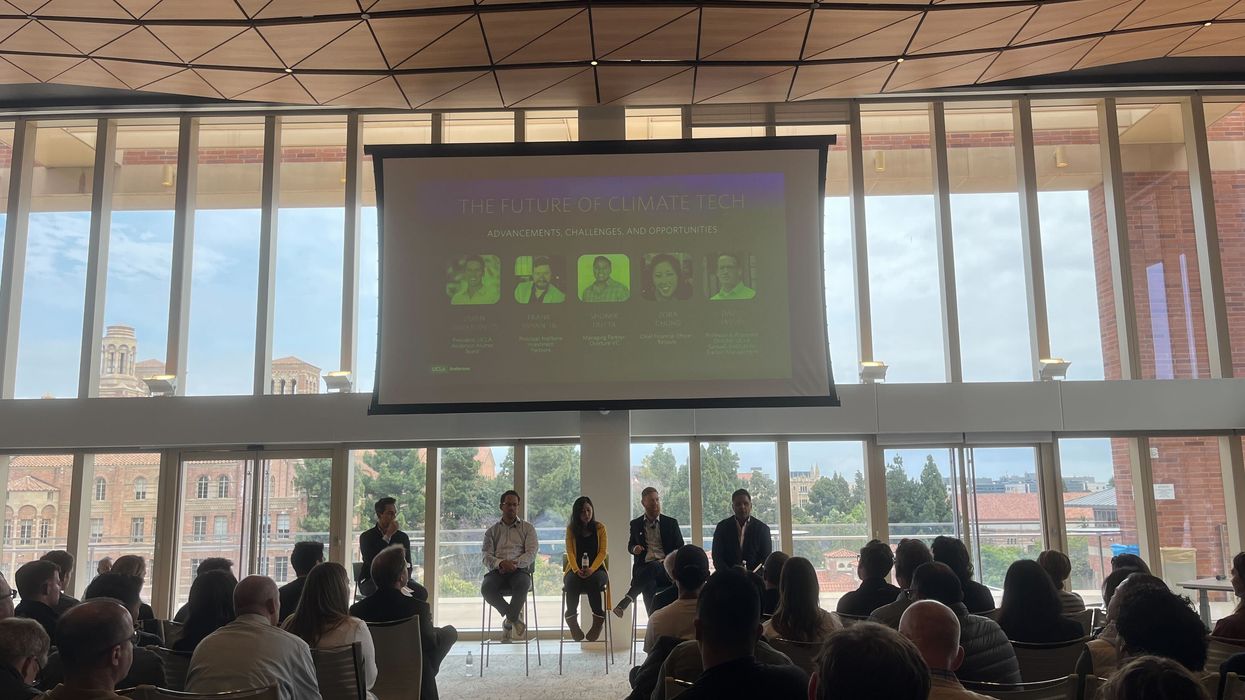LA Tech Week's Climate Panel Unveils Funding Secrets for Green Startups
Samson Amore is a reporter for dot.LA. He holds a degree in journalism from Emerson College. Send tips or pitches to samsonamore@dot.la and find him on Twitter @Samsonamore.

In a region known for being a national trailblazer when it comes to climate policies, there’s no shortage of green energy startups in L.A. looking for funding. There’s also a plethora of investors and incubators, which means founders looking for cash flow should be extra specific about their value proposition when they pitch to cut through the noise. At least that was the message coming from the panelists at the UCLA Anderson School of Management on Tuesday.
LA Tech Week’s panel on the Future of Climate Tech: Advancements, Challenges, and Opportunities, hosted by UCLA’s business school, discussed a number of ongoing issues in the green tech industry, including how the 2024 presidential election could affect funding for climate initiatives.
David Jassby, associate director of UCLA Institute for Carbon Management, said he has been writing educational grants to fund graduate students’ research since Obama’s presidency. “In terms of the university, the research topics and the research dollars have not really changed, which is, to me, really encouraging,” Jassby said, noting that federal workers are eager to issue grants for cutting-edge climate research, regardless of political affiliation.
But there was more on the table than just climate politics. The panelists were particularly eager to advise the room, which was packed with students, founders and other investors, about how to get their green startups funded.
Zora Chung, chief financial officer of Rejoule, a battery diagnostics startup, said that she regularly speaks with engineers and has often noticed that they can get too bogged down in the science rather than focusing on pitching the product and its use case. To that end, she noted that it is crucial for startups to be clear about the value of the product and who it will serve. “Defining the value proposition isn't as simple as just seeing what it is. It actually needs to be very specific to who you think is your core customer service,” Chung said. Instead of comparing their startup to another, Chung believes it is more important for founders to focus on fundamentals like the goals of the service and its audience.
In climate tech and other science-heavy industries, making a clear pitch is even more crucial. Frank Bryan, founder of venture capital firm Halftone Investment Partners, said green tech startups have to “tell a business story.”
Bryan said that those who are deeply involved in the research and development aspects of the product often forget to think about who the customers are, why they might purchase the product and how much they’re willing to pay. By answering these questions in a pitch, entrepreneurs can show investors that their startup is in a phase poised for growth, that “you’re not just a chemical process, you've actually developed this into a real plan that is going to result in a financial return, which is ultimately what I'm trying to get at,” Bryan said.
Shomik Dutta, co-founder and managing partner of climate venture fund Overture VC, said that he prefers to “invest in painkillers rather than vitamins,” i.e. in startups that aim to solve climate issues rather than those who deceive the public by using eco-friendly marketing labels.
The issue of waste management and recycling particularly excited several of the panelists. Bryan is currently working with a company that recycles plastic waste from the air bag industry. “Everything that's made in the world has waste streams that are either emitted [by a] landfill or its heat. Those can be converted, they can be shredded and liquefied and cracked and into hydrogen, carbon dioxide or carbon,” Bryan said.
Although the U.S. is still grappling with disposal strategies of hazardous waste produced by industrial mining, many states are supportive of innovation in this area, Jassby said. According to the Environmental Protection Agency, the country generates hundreds of millions tons of waste every year; less than a third of this waste is recycled or composted. In other words, Jassby said, “recycling of waste is tremendous.”
- Overture VC’s Shomik Dutta on Investing in Climate Change Technology ›
- The Climate Crisis Is Changing How LA VCs Invest — Here's How ›
- Climate Tech - dot.LA ›
- Here's What People Are Saying about LA Tech Week on Twitter - dot.LA ›
- LA Tech Week: Greentech Startups To Watch - dot.LA ›
- Here's What People Are Saying about LA Tech Week on Twitter - dot.LA ›
- A Recap of the Triumphs of LA Tech Week 2023 - dot.LA ›
Samson Amore is a reporter for dot.LA. He holds a degree in journalism from Emerson College. Send tips or pitches to samsonamore@dot.la and find him on Twitter @Samsonamore.





 Image Source: Skyryse
Image Source: Skyryse